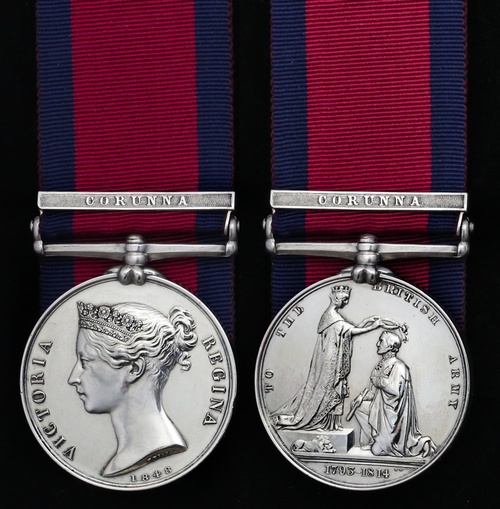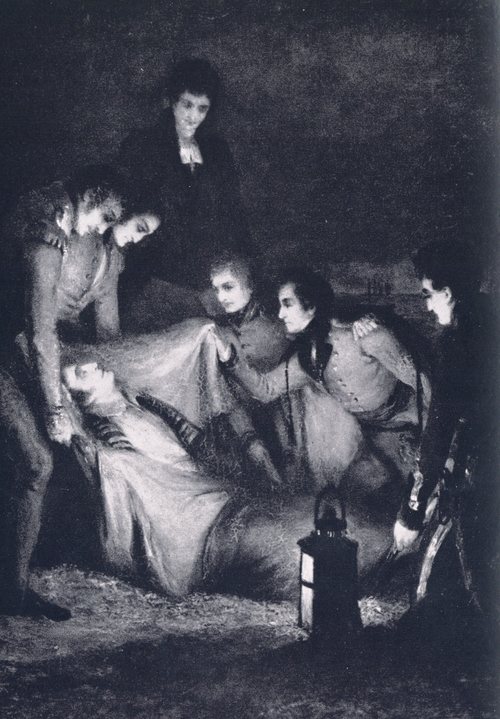Auction: 17001 - Orders, Decorations and Medals
Lot: 4
(x) 'To my servant (provided he shall be in my service at my death) I leave the sum of £100 and one year's wages over and above all wages due him at the time of my decease, and all my clothes and apparel ... '
The last Will and Testament of General Sir Paul Anderson, K.C.H., C.B., rewards the loyal services of John Baker, his military - and civilian - servant for an astonishing 43 years.
A rare and outstanding Military General Service 1793-1814 Medal awarded to Private John Baker, 60th Foot, one of just five men in his regiment to qualify for the clasp for Corunna: for over four decades the loyal soldier - and civilian - servant of General Sir Paul Anderson, K.C.H., C.B., he was almost certainly present at Sir John Moore's death and burial
In his capacity as Deputy Adjutant-General to Sir John Moore, and indeed as his closest friend, Anderson - with Baker at his side - shared directly in the great man's trials and tribulations, from the ill-fated expeditions to Sweden and Walcheren to his death from wounds received in the battle of Corunna: from voyages and quarters shared - and even a week's leave at Sir John's residence in England - it seems the three men were inseparable
Moore's own servant, Francois David, enjoyed an equally successful relationship with his master, the gallant Sir John requesting that all be done for him as he lay on his death bed at Corunna. This is not perhaps surprising, for the position of officer's servant was a much coveted and esteemed one, evidence for which may be found in the case of Leonard Sprotsom of the 3rd Foot Guards: he shot himself on being informed that he was to be returned to the ranks
Military General Service 1793-1814, 1 clasp, Corunna (John Baker, 60th Foot), minor edge bruise, very fine
John Baker was born at Kentisbeare, near Cullompton, Devon, in the Spring of 1784 and enlisted in the Worcestershire Militia about 1803.
Discharged to volunteer for regular service in April 1804, he joined the 2/40th Regiment at Winchester in the following month. Here, then, his first encounter with the man he would serve loyally over the coming years: Paul Anderson. Then a Major, Anderson was shortly to be appointed Assistant Adjutant-General to his great friend, Sir John Moore. Prior to his departure to join Moore in Sicily in June 1806, and as verified by regimental musters of the period, Anderson enlisted Baker as his servant.
Soldier servant
In January 1808, Anderson exchanged to the 60th Regiment in the rank of Lieutenant-Colonel, and Baker joined him a few weeks later, being borne on the books of a Recruiting Company of the 4/60th. The pair of them joined Sir John Moore aboard H.M.S Mars at Yarmouth in May, which ship was bound for Sweden with a large fleet and 12,000 troops. It proved to be an abortive expedition and on his return Moore invited Anderson - with Baker - to his family home for a week's rest.
On the last day of July 1808, the three of them were embarked for Portugal in the Audacious. It proved to be a protracted and uncomfortable voyage, the Portuguese refusing permission for Sir John's force to disembark. Meanwhile, Sir Arthur Wellesley fought the battle of Vimiera and, just six days after Sir John finally got ashore with his men, the Convention of Cintra was ratified: the ambitious Wellesley - and Sir Hew Dalrymple and Sir Harry Burrard - were recalled to England to defend their actions.
Corunna - death and burial of Sir John Moore
Moore having been appointed C.-in-C. Portugal, he appointed Anderson his Deputy Adjutant-General (D.A.G.) and Commandant of his H.Q., where, undoubtedly, Baker joined him. Here Moore formulated the plans that would lead to the battle of Corunna, his force eventually departing Lisbon in October 1808. The challenges of the harsh winter that ensued are well-known, the eventual retreat to Corunna often being undertaken in a hurricane of wind and snow: wives and children of the soldiers were to be found hunched on the roadside, stripped of their clothes and left to freeze to death.
The British Army - now about 15,000 strong - finally arrived in Corunna on 11 January 1809, its ranks ragged, shoeless and starving. It was here, five days later, that they faced Marshal Soult's much superior army, Anderson being charged by Moore to ensure the embarkation ran smoothly as battle commenced. A Narrative of the Campaign of the British Army in Spain takes up the story:
'Moore proceeded to the 50th and watched them clear the village of Elvina. Then he was off to the 42nd Highlanders, charging with them to a wall. Halting there, he was speaking to Captain Hardinge of his staff, their horses touching, when a cannon ball struck Sir John Moore, carrying away his left shoulder and part of the collar bone, leaving the arm hanging by a thread of skin and flesh. He was knocked to the ground, where his aides vainly attempted to staunch the flow of blood. A surgeon was sent for. Moore was carried off the field for nearly three miles on a blanket and sashes by a sergeant and six men of the 42nd Highlanders. He was conveyed to his lodgings in Corunna. There at dusk he met his closest friend, Lieutenant-Colonel Paul Anderson, to whom he said: "Anderson, don't leave me." Even though in great pain, Moore spoke to Anderson of a number of things to be done, officers to be promoted, messages to be given to family, even voicing concern for his servant, Francois David.'
Moore then pressed his hand close to Anderson and in a few minutes died without a struggle. His concern for his servant is illustrative of the great bond established between such men and this lends credence to contention that Baker was present - with his master - on that solemn occasion. His presence at the great man's burial is supported by the fact he was asked to identify relevant paintings - and those depicted in them - following Anderson's death in 1851; see Carola Oman's Sir John Moore for further details.
Anderson and Baker were safely embarked for England, the latter eventually being awarded the Military General Service Medal with single clasp 'Corunna': owing to being extra regimentally employed, five men in the 60th likewise qualified, three of their Medals being issued as single clasps awards.
Walcheren
Baker next accompanied Anderson on the ill-fated Walcheren expedition, where, at Flushing, his master, with a company of the Royals, stormed an enemy entrenchment and killed or took prisoner an entire piquet of 100 men.
However, in the summer of 1810, a wide spread epidemic of ophthalmia swept through the ranks of the British army and Baker appears to have been among the victims - his final discharge papers state that he contracted the infection in Portugal. Either way, ophthalmia was a form of granular conjunctivitis and capable of causing blindness or severely impaired sight if not treated.
On his eventual return home in December 1811, Baker was discharged to a pension in London on the recommendation of Surgeon James Carrick Moore of the 2nd Regiment of Life Guards. The Surgeon, Sir John Moore's brother and a good friend of Anderson, thereby paved the way for Baker to receive a suspiciously generous pension of one shilling per diem.
Civilian servant
But here the story does not end: Baker now took up employment as Anderson's civilian servant, a role which he would fulfil until his master's death in 1851.
Hence many experiences shared over the intervening years, starting with a tour of duty in Malta where Anderson served as D.A.G. to Sir Hildebrand Oakes in 1811-15. Anderson, who was appointed a C.B. on his return, gained advancement to Major-General in August 1819 and, on Wellington's recommendation, was appointed Lieutenant-Governor of Gravesend and Tilbury Fort in December 1827. Latterly the Governor of Pendennis Castle, he was appointed K.C.H. and attained the rank of General.
By 1840, the General and Baker has settled at 10 Paragon Buildings in Bath, Somerset, where, in January 1848, the latter witnessed the signing of his master's final Will and Testament. By the time of Anderson's death at his residence in December 1851, aged 84 years, Baker had been in his service for an astonishing 43 years.
Baker moved to Exeter, Devon, where he died on 3 January 1860, aged 75 years.
Sold with an extensive file of copied research, from which the above biographical entry has been taken; together with books of Corunna interest (5), among them Carola Oman's biography Sir John Moore, in which the remarkable Baker is mentioned.
Subject to 5% tax on Hammer Price in addition to 20% VAT on Buyer’s Premium. For more information please view Terms and Conditions for Buyers.
Sold for
£3,200







